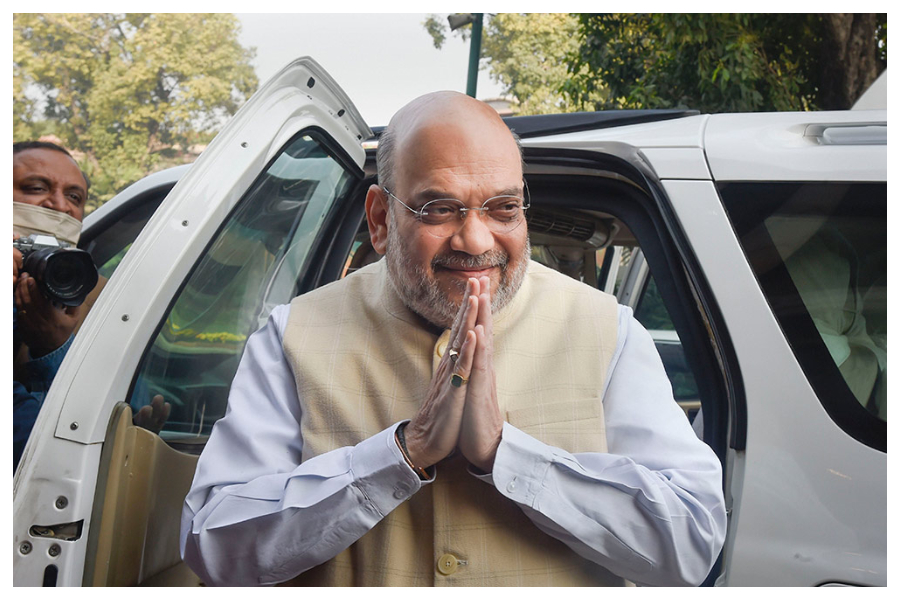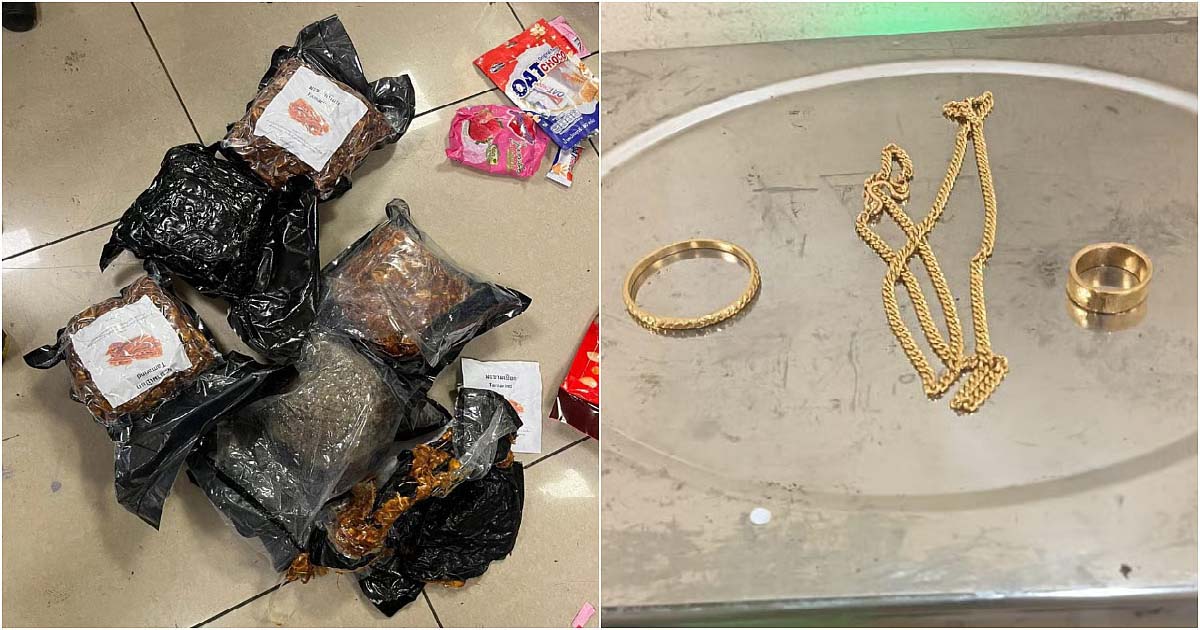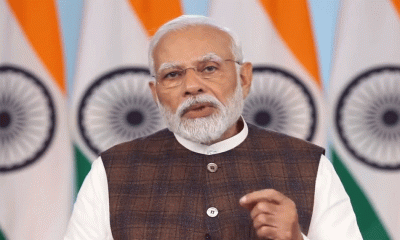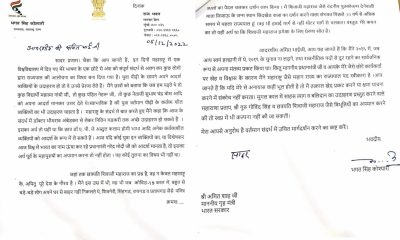Politics
Day is not far when AFSPA will be revoked in Assam: Amit Shah

Union Home Minister Amit Shah on Tuesday said that with the improved law and order situation, the day is not far when AFSPA will be revoked in Assam.
The Home Minister had on March 31 announced to reduce the disturbed areas under the Armed Forces (Special Power) Act, 1958 (AFSPA) in three northeastern states – Assam, Nagaland and Manipur. The AFSPA is in force in Assam since 1990 and as per the Centre’s announcement, it was removed completely from 23 districts and it would remain enforced in 9 districts and one sub-division in Assam with effect from April 1.
After presenting the President’s Colour to the Assam Police at a ceremony here, the Home Minister said that due to the constant efforts of the Centre and Chief Minister Himanta Biswa Sarma, almost all the extremist outfits have entered into peace agreements and surrendered before the government. He said that the surrendered militants are being jointly rehabilitated by the central and state governments.
Highlighting the glorious history and achievements of Assam police, Shah said that besides militancy, the Assam police during the past several decades has successfully tackled infiltration, border issues, drug peddling, smuggling of arms, cattle and other contraband, poaching of rhinos, human trafficking and several other social issues.
He said, “During the Bangladesh liberation war in 1971 and communal riots, the Assam police performed brilliantly and courageously.” Shah said that when India got Independence, there were 8,000 Assam policemen and now their strength has increased to 70,000. During the past seven decades, 886 Assam policemen were martyred. “Assam police also very tactfully dealt with the inter-state problems,” Shah added.
Addressing the gathering, Assam Chief Minister Himanta Biswa Sarma urged the police to work for the weaker sections of the society and appreciated their efforts in the decline of militant activities in the state. “Hundreds of cadres of the eight militant groups have joined the mainstream and another 13 outfits are in dialogue with the government,” Sarma said.
Maharashtra
Maharashtra: Demand For Love Jihad Law Intensifies As Hindu Organisation Leads State Campaign

The Hindu Janajagruti Samiti, a right wing organisation, on Wednesday urged the Maharashtra government to introduce a stringent law against what it describes as love jihad during the winter session of the state legislature in Nagpur. The term is used by right wing groups to allege that Muslim men target Hindu women for marriage with the intent of religious conversion.
The call comes after a coordinated campaign across the state that saw the involvement of more than 160 Hindu organisations from 20 districts. The Samiti stated that the participants pressed the government to pass a strict law to curb alleged forced conversions linked to marriage.
Sunil Ghanvat, the Samiti’s state organiser for Maharashtra and Chhattisgarh, said in a statement that more than 1,600 activists and citizens took part in rallies, public meetings and memorandum drives across major districts. These included Mumbai, Jalgaon, Dhule, Chhatrapati Sambhajinagar, Jalna, Ahilyanagar, Akola, Amravati, Chandrapur, Nagpur, Satara, Pune, Solapur, Nashik, Ratnagiri and Sindhudurg.
Memorandums were submitted to district collectors, taluka administrations, elected representatives, the Governor, the Chief Minister and the home department, urging the state to act.
The Samiti noted that states such as Uttar Pradesh, Gujarat, Madhya Pradesh, Assam and Uttarakhand have already enacted laws aimed at curbing forced conversions. It argued that Maharashtra should introduce similar legislation with provisions for life imprisonment and registration of non-bailable offences.
Alongside the push for a love jihad law, the organisations also raised the demand for an anti land grabbing law, stating that such measures would strengthen legal safeguards in the state.
Crime
Mumbai Airport Customs Seize ₹43 Crore Drugs, ₹1.51 Cr Gold & ₹87 Lakh Diamonds In 15 Smuggling Cases Over Past 8 Days

Mumbai, Dec 10: The Mumbai Airport Customs in 15 cases over the past eight days have seized smuggled drugs worth ₹43 crore, gold worth ₹1.51 crore and diamonds valued at ₹87 lakh.
According to the Customs, during December 03 till December 10 they detected ten cases of smuggling of hydroponic weed.
“Based on spot profiling, a total of 37.26 kg of suspected hydroponic weed valued at approximately ₹37.26 crore in the illicit market were recovered under seven cases from nine passengers who had arrived from Bangkok via various flights and were arrested under the provisions of the Narcotic Drugs and Psychotropic Substances (NDPS) Act,” said a Customs officer.
“The modus operandi used by the accused in these cases were that the passengers attempted to smuggle hydroponic weed by concealing the contraband inside the trolley bags and using the baggage tags of another flight to avoid detection by Customs Officers. In some cases, the passengers attempted to smuggle hydroponic weed by concealing the contraband inside the lumps of tamarind to avoid detection,” the officer said.
In three other cases, based on specific intelligence, a total of 6 kg of suspected hydroponic weed, valued at approximately ₹6 crore in the illicit market were recovered from three passengers who had arrived from Bangkok via various flights and were arrested under the provisions of the NDPS Act.
“Other than the NDPS cases, four gold smuggling cases were booked in which a total of 1,256 grams of gold valued at ₹1.51 crore were recovered and seized from four passengers. In one case, diamonds valued at ₹87.75 lakh were recovered and seized from one passenger,” the officer said.
Maharashtra
Preparations for Sunni Dawat-e-Islami’s three-day global Sunni gathering in full swing

Mumbai: Like every year, this year too, the 33rd annual gathering of the Sunni Dawat-e-Islami Movement is being held on Friday, Saturday and Sunday, December 12, 13 and 14 at Azad Maidan, Wadi Noor, opposite CST, Mumbai. Like last year, this year too, the gathering on the first day, Friday, will be for women only, while the remaining two days will be reserved for men. Insha Allah, many scholars, preachers and mashaikhs from the country and abroad will participate in this global gathering. The preparations for the gathering were started last Saturday in the evening after the weekly central gathering. Urdu Media In-charge Maulana Mazhar Hussain Alimi said that the leaders of the movement are making full efforts to make the three-day gathering a success. Efforts are being made to provide all possible facilities so that the audience and attendees do not face any kind of trouble. As per tradition, this year too, the three-day global gathering will be broadcast live on sdichannel, which will be directly accessible to those who wish to learn religious teachings from all over the world. The women’s gathering on the first day will feature speeches on important topics such as “Women’s Intellectual Taste”, “Women’s Real Ornament: High Character and Modesty”, and “Women’s Share in Inheritance”. In addition, the researcher of modern issues Hazrat Mufti Muhammad Nizamuddin (President Mufti of Jamia Ashrafia Mubarakpur) will answer questions asked by women about Islam. Ameer Sunni Dawat-e-Islami and the spiritual leader of this gathering, the great preacher Hazrat Maulana Muhammad Shakir Noori, has appealed to people to participate in the gathering as much as possible, understand the message of religion and act on it. Ameer Sunni Dawat-e-Islami has said that they should also come and bring their friends and thus become a means of transmitting religion. He has appealed to Muslims to send women from their homes to the gathering on the first day so that they can Attend the gathering to learn religious teachings, improve themselves and advise others. There will be important speeches by great scholars and preachers in the gathering on the second and third days. There will be detailed speeches on important topics such as “The Miracle of the Holy Quran”, “The Spiritual Life of the Holy Prophet (PBUH), “The Envoy of Peace (PBUH), “Searching for Humans in Humans”, “Ethics and Spiritual Training of Youth”, “Religious Information and Artificial Intelligence”, “Signs of the Pleasure and Displeasure of Allah Almighty”. Islamic thinker Allama Qamar-uz-Zaman Azmi (Secretary General World Islamic Mission London) will deliver a speech on the third day. Insha Allah, the commentator of the Quran, Khalifah Mufti Azam Hind, Hazrat Allama Zaheeruddin Khan Rizvi, will also deliver an insightful speech. In the gathering on the third day, there will be a gathering after Zuhr prayers, followed by a lecture on the latest issues of Bukhari Sharif, in which the last hadith of Bukhari Sharif will be delivered by Hazrat Allama Mufti Muhammad Nizamuddin Rizvi (Jami’ Ashrafia Mubarakpur). On this occasion, prayers are accepted in the presence of the Lord, so be sure to participate in this prayer as well.
In order to facilitate the participants of the gathering, a large number of ablution rooms and toilets are being built, and more than sixty cameras are being installed throughout the gathering as part of security arrangements. In addition, about two thousand women will volunteer for the women’s gathering, while more than one thousand male volunteers will serve in the gathering on the second and third days. The police have requested the participants of the gathering not to bring handy cameras, laptops, wires, batteries, matchboxes, lighters, nail cutters and other electronic equipment that runs on batteries. For security reasons, parking of motorcycles or any other vehicle around the Azad Maidan is not allowed.
-

 Crime3 years ago
Crime3 years agoClass 10 student jumps to death in Jaipur
-

 Maharashtra1 year ago
Maharashtra1 year agoMumbai Local Train Update: Central Railway’s New Timetable Comes Into Effect; Check Full List Of Revised Timings & Stations
-

 Maharashtra1 year ago
Maharashtra1 year agoMumbai To Go Toll-Free Tonight! Maharashtra Govt Announces Complete Toll Waiver For Light Motor Vehicles At All 5 Entry Points Of City
-

 Maharashtra1 year ago
Maharashtra1 year agoFalse photo of Imtiaz Jaleel’s rally, exposing the fooling conspiracy
-

 National News1 year ago
National News1 year agoMinistry of Railways rolls out Special Drive 4.0 with focus on digitisation, cleanliness, inclusiveness and grievance redressal
-

 Maharashtra1 year ago
Maharashtra1 year agoMaharashtra Elections 2024: Mumbai Metro & BEST Services Extended Till Midnight On Voting Day
-

 National News1 year ago
National News1 year agoJ&K: 4 Jawans Killed, 28 Injured After Bus Carrying BSF Personnel For Poll Duty Falls Into Gorge In Budgam; Terrifying Visuals Surface
-

 Crime1 year ago
Crime1 year agoBaba Siddique Murder: Mumbai Police Unable To Get Lawrence Bishnoi Custody Due To Home Ministry Order, Says Report


















